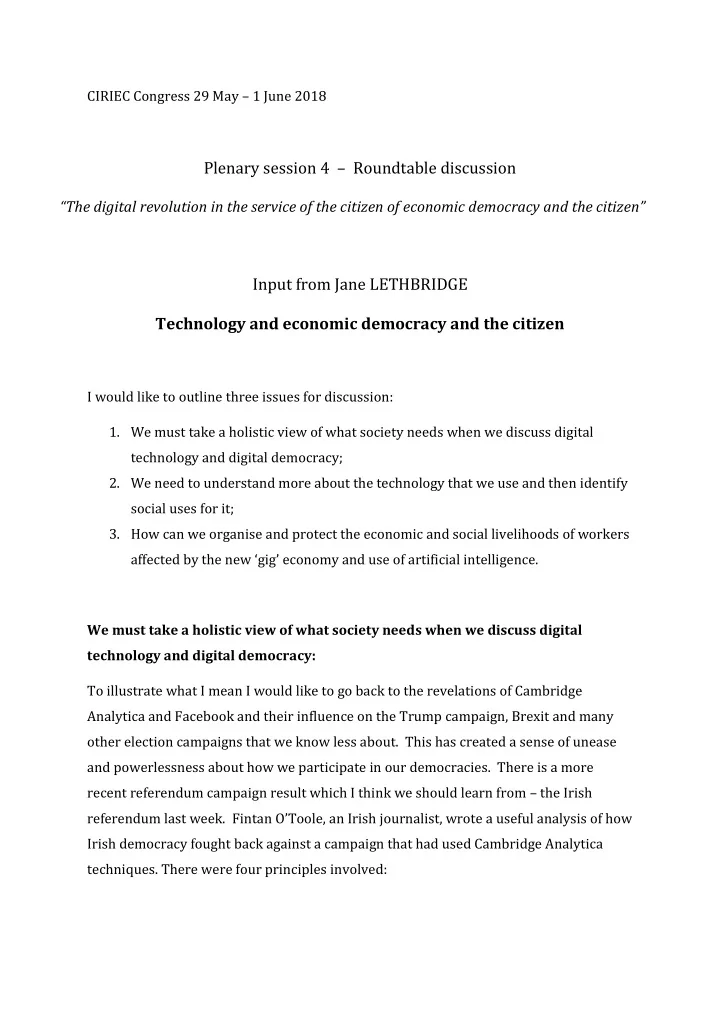

CIRIEC Congress 29 May – 1 June 2018 Plenary session 4 – Roundtable discussion “The digital revolution in the service of the citizen of economic democracy and the citizen” Input from Jane LETHBRIDGE Technology and economic democracy and the citizen I would like to outline three issues for discussion: 1. We must take a holistic view of what society needs when we discuss digital technology and digital democracy; 2. We need to understand more about the technology that we use and then identify social uses for it; 3. How can we organise and protect the economic and social livelihoods of workers affected by the new ‘gig’ economy and use of artificial intelligence. We must take a holistic view of what society needs when we discuss digital technology and digital democracy: To illustrate what I mean I would like to go back to the revelations of Cambridge Analytica and Facebook and their influence on the Trump campaign, Brexit and many other election campaigns that we know less about. This has created a sense of unease and powerlessness about how we participate in our democracies. There is a more recent referendum campaign result which I think we should learn from – the Irish referendum last week. Fintan O’Toole, an Irish journalist, wrote a useful analysis of how Irish democracy fought back against a campaign that had used Cambridge Analytica techniques. There were four principles involved:
a) Trust the people and use deliberative democracy – a Citizen’s Assembly – 99 randomly chosen people gave up their weekends to listen to 40 experts on medicine, law and ethics, to women who had been affected by Ireland’s restrictive abortion laws and to 17 lobby groups. This group of 99 people came up with more open recommendations than anyone expected and much more than politicians would have done. b) Be honest – the Irish government explained what type of legislation it would pass if this clause was repealed. c) Talk to everyone and don’t make assumptions about anyone. d) Make the political person – tell people’s stories. What can we learn from this? We need to think holistically about politics and campaigning. Digital democracy is only one type of campaigning. We must not forget that there are many other forms of democracy which can be very powerful and that the issues which we campaign on have many facets to them and we must explore them. We need to understand more about the technology that we use and then identify social uses for it: How many of us understand what data is collected from us when we do a simple Google search and visit half a dozen websites? The Cambridge Analytica revelations have shown that governments/ politicians/ civil servants do not understand very much either. The UK Information Commissioner took five days to get permission to enter the Cambridge Analytica offices, let alone prosecute. Global corporations are not benign interests. They have their business models to protect and are in the process of promoting a society with a strongly individualistic way of working, rather than one that has shared universal and collective goals. How do we address this? We must take responsibility to find out more – study groups, action learning, information-sharing – so that we demystify digital technology. Trade unions, cooperative, social economy organisations and the public sector all need to try and understand how information is being collected and used. We need IT specialists to help us but we need to identify questions about how this technology could be used to solve
social problems. IT expertise has to be democratised, for example, having Citizen’s Assemblies and other types of campaigning in different countries. Only when we understand more will we be able to use technology for the benefit of society. One example of how people have worked together to understand new technology is the Network for Social Evaluation of Technologies of Latin America ( Red Tecla ) This was set up over ten years ago to do a public evaluation of new technologies. It aims to: “ To understand the goals /logic of new technologies and stimulate debate beyond the scientific field to integrate diverse systems of knowledge.” It trie s to anticipate the significance of new technologies for society and to establish a dialogue with policy makers at local, regional and national levels (http://redtecla.org/). How can we organise and protect the economic and social livelihoods of workers affected by the new ‘gig’ economy and use of artificial intelligence ? This links to having a better understanding of what digital technology can do. We need social protection systems that are strong enough to withstand changes in forms of employment, we need to campaign for basic labour rights and we need to use digital technology for the benefit of workers. Jane Lethbridge 1 June 2018
Recommend
More recommend